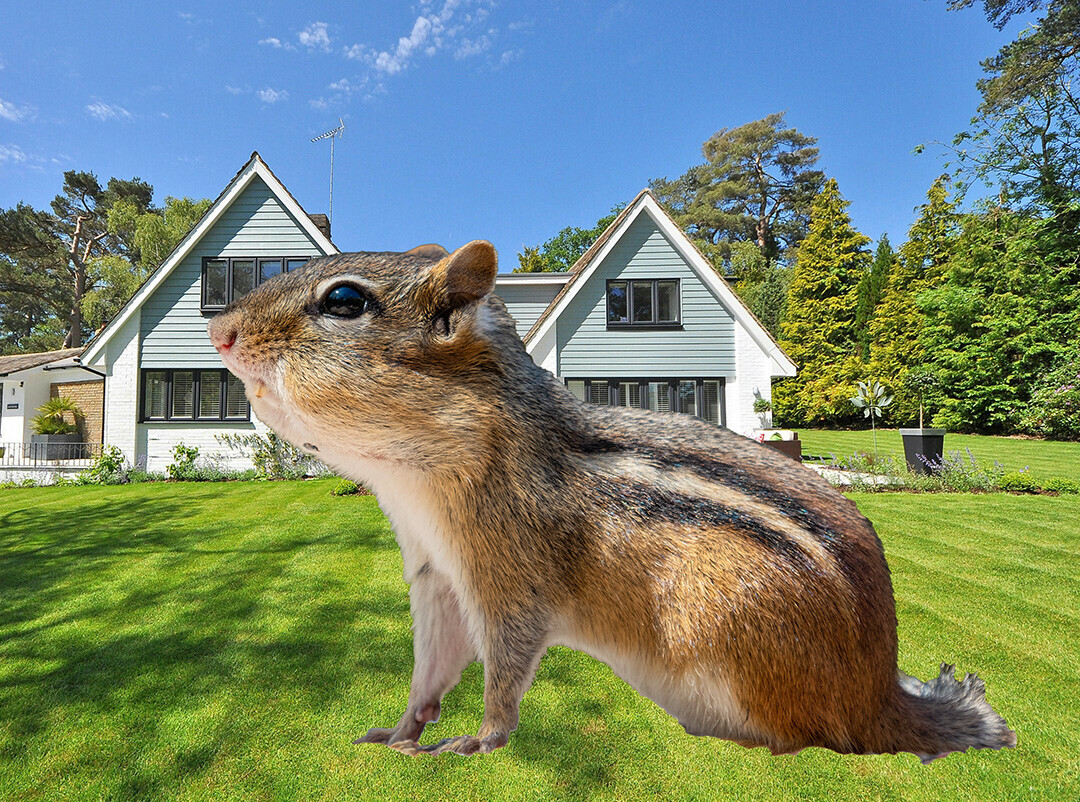The Great Chipmunk Wars
Electrified chicken wire? Plastic owls? A moat? How the heck does one humanely rid their yard of chipmunk infestation?!

I rototilled. I picked rock. I limed, fertilized, and peat mossed (peated moss?). I raked once more and was finally able to broadcast grass seed and dutifully drag a rubber mat over the whole area, a la The Victory Garden, to bury the seeds to just the right level for maximum germination. By dinner time, I had a final coating of straw down, the sprinklers were set, and all was ready.
I stood on our deck the next morning, coffee cup in hand, to survey what Ron the Creator had wrought. I imagined a lush carpet of green, a place for having tea, playing croquet, that kind of stuff. The sun was shining. The birds were singing. The cute little chipmunks were scampering to and fro across the soft earth. Cute little bushy tails, cute black and white stripes, cute little cheeks bulging with … with … grass seed! The first shot had been fired.
I had been slow to warm to the idea of lawn-making at first – something there that didn’t quite jibe with my baby boomer contempt for symbols of suburbia, especially since our home was stuck in the middle of the sticks. But now, after all the work, after sowing my crop, I was indignant. This obviously meant war.
My first impulse was to pull out my .22, an ancient single shot, for a quick, surgical removal of the problem. This is the country, varmints here are on their own. But I had some qualms. The previous owners of our home had hand-fed corn to the chipmunks, practically raised them. Shooting them would be like an execution: There is no sport in looking down the sights at a chippie not 6 feet away.
And then there are my kids. I could hear them mimicking my own words already: “That’s not very nice, Dad. They’re not hurting us, are they?” They don’t appreciate ideas like “investment” and “resale value,” though, come to think of it, I’m not sure I do either.
The previous owners of our home had hand-fed corn to the chipmunks, practically raised them. Shooting them would be like an execution: There is no sport in looking down the sights at a chippie not 6 feet away.
I reconsidered. Was there another solution my kids wouldn’t notice? Poison seemed pretty sneaky, if not indiscriminate. Getting a cat also felt a little shady, although hardly a day goes by here without being pressed by a neighbor to take a kitten or a zucchini. I do have a pair of dogs – hunting dogs even – but my Springer has no hearing, and my Lab, I suspect, has little or no brain. I roused the brainless one anyway, took her to the battlefield.
In respect for her lack of an I.Q., I reduced my brief on the subject of marauding chipmunks to “Sic ’em, Gina!” She did bound around a bit, as if expecting a Green-winged Teal to suddenly flush from my wife’s perennials, and her wide-eyed expression seemed to say, “Wha? Huh? Ducks?” The chipmunks scurried up the nearest tree to get a better vantage point on the action. A couple of hours later, I think the light bulb might have finally gone on for Gina, as I could hear my wife calmly explaining (with a stout oak limb in hand) the wisdom of staying out of her peonies, chipmunks or not.
So dogs and other surrogate enforcers were out. I went into retreat for a strategy session with some friends. One told me he had gone right to the heart of the matter with his chipmunk assault. Finding their favorite hole, he ran about 20 feet of garden hose down, right into the rodents’ bunkers. After running the water for half an hour, he figured victory was his; However, he discovered nothing short of a four-wheel drive John Deere was going to pull that hose out of the ground. (He confessed to cutting the hose off later under the cover of darkness.)
Trapping was also suggested. My closest neighbor had used a simple box trap baited with apples with good results. He found a chipmunk in his trap nearly every day, which he would then transport to a more hospitable location a mile away. He admitted he never saw a drop in the population and had considered daubing his captives with paint, suspecting they were somehow finding their way back. The trapping experiment ended after he caught a skunk who saw no humor in the situation.
Another friend suggested buying a 40-pound bad of sunflower seeds and dumping it well away from the lawn. This sounded ingenious, if not suitably humane, but was I ready for appeasement?
I brainstormed. Electrified chicken wire? Plastic owls? A moat? My solutions started to sound a bit obsessive, and more than my kids’ recriminations were starting to bother me. What is it that made me feel I had some divine authority over the “lower species”? I had read the Native Americans, who called the little creature “chipmuck” after the chirping sound it makes, held a spiritual reverence for all living things. Was my attitude progress?
Back out to the battlefield. They were still there, scouring the ground for more groceries. “Chippie, chippie,” my 3-year-old called, while her brother plowed the ground with a toy tractor. If I could justify removing the chipmunks, who would be next? The robin whose favorite outhouse is my bicycle seat? The grumpy fox snake that startles me every time I go near the wood pile? A line was being drawn.
In his essay “Man’s Place in the Animal World,” Mark Twain wrote that after studying the traits of animals and men, he had decided man was not ascended from the “lower animals” but descended from the higher animals. Twain, if he had a lawn with chipmunks, probably would have gotten a kick out of the little buggers. He’d probably have envied their ingenuity, their lack of arrogance or pretense, as he did in all animals, except humans. So, what the heck. With Twain as an ally, surrender doesn’t sound so bad. Besides, I can always replant, right?
Ron Davis is the author of Shiny Side Up and Rubber Side Down, two books about the improbable inclination to travel on two wheels, now available at the Local Store.


